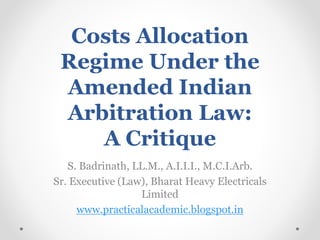Cost Allocation under the Amended Indian Arbitration Law: A Critique
- 1. Costs Allocation Regime Under the Amended Indian Arbitration Law: A Critique S. Badrinath, LL.M., A.I.I.I., M.C.I.Arb. Sr. Executive (Law), Bharat Heavy Electricals Limited www.practicalacademic.blogspot.in
- 2. Synopsis • Allocation of costs was improper under the pre- amendment (pre-2015) regime. • The Law Commission (246th Report) recommended that it was just to allocate costs in a manner which reflected the parties’ relative success and failure in the arbitration. • The 2015 amendments on costs allocation are in furtherance of this aim, despite the shortcomings in the text. • Courts and tribunals have to change their existing practice and pass a conscious costs order with the general rule being the English rule.
- 3. Costs Allocation- Pre- Amendment “(8) Unless otherwise agreed by the parties,- (a) the costs of an arbitration shall be fixed by the arbitral tribunal; • Section 31(8)- Default rule • Section 31(8)(a)- Positive duty on the arbitral tribunal to fix costs • Section 31(8)(b)- How the said duty is to be exercised • Explanation- Definition of Costs- “reasonable”
- 4. Problems with Pre-Amendment Position on Costs Allocation • Too open textured > Enormous discretion • No principled decision-making on costs • Costs “imposed” and not “awarded”- costs as penalty rather than compensation • Failure by parties and their counsel to make submissions on costs. • Gave incentive for censurable tactics: o Failure to honour arbitration agreements o Frivolous challenges to arbitral awards • Parties expend huge costs in arbitration related court proceedings. e.g., Section 11 proceedings but courts generally failed to allocate costs.
- 5. International Practice in Costs Allocation • English Rule and the American Rule • International Practice leans in favour of the English Rule o Art. 42(1) of the UNCITRAL Arbitration Rules, 2010 “costs.. shall … be borne by the unsuccessful party…” [Model Law- neutral- reflects the erstwhile Section 31(8) of the Indian 1996 Act] o Section 61(2) of the English Act- English Rule • American Rule- USA, Japan, Maurutius • Indemnity Costs- Dilatory tactics- Hong Kong
- 6. Justification for Amendments to Costs Allocation o Law Commission’s Recommendations • “just to allocate costs in a manner which reflects the parties’ relative success and failure in the arbitration, • unless special circumstances warrant an exception or the parties otherwise agree” o Special circumstances should be mentioned o Pre-Amendment Position imposed a positive duty on courts o Current position being an improvement on the existing provisions- costs allocation is mandatory
- 7. 2015 Amendments on Costs Allocation- S 31A(1) & (2) • Applies to Court hearing arbitration related matters and to tribunals • costs order is mandatory (notwithstanding the wordings of Section 31A(2): “If the Court or the Tribunal decides..”) • General Rule- unsuccessful party to bear the costs of successful party • Deviation from general rule- reasons to be recorded • Power is to be exercised notwithstanding the CPC, 1908
- 8. Textual Issues with Sections 31A(1) & (2) • Problems (1) Faulty Drafting, (2) Words make costs award discretionary • Bad Structure of Section 31A(2): “If the Court or arbitral tribunal decides to make an order as to payment of costs,— (a) the general rule is that the unsuccessful party shall be ordered to pay the costs of the successful party; or (b) the Court or arbitral tribunal may make a different order for reasons to be recorded in writing. • Chapeau read with (b) makes little textual sense. • Two different sub-sections/(b) could’ve been a proviso
- 9. Whether a Costs Award is discretionary? • Problem with the text related to this question • Erstwhile Section 31(8): Costs Award was mandatory (“(a) the costs of an arbitration shall be fixed by the arbitral tribunal”& “(b) the arbitral tribunal shall specify…” • Law Commission’s Recommendations • Costs Award under the New Regime is mandatory: o Law Commission’s Recommendations o New Regime is an improvement upon old regime o “Nudges” Courts & Tribunals to pass proper costs awards/orders o Heydon’s Rule of purposive construction-Evil>Remedy>Statute
- 10. Costs Allocation under the New Regime • Study on Court behaviour in cost allocation- too early. • Tribunal behaviour- difficult to assess- data availability either through arbitral institutions/ Section 34 petitions • Inkling- Section 11 & Other Petitions : Whether Court allocate costs properly? • Courts failing to pass order on costs (instances) o Sheetal Maruti Kurundwade v. Metal Power Analytical (I) Pvt. Ltd. and Ors. MANU/MH/0328/2017 (Bom.HC) o Voestalpine Schienen GmbH v. Delhi Metro Rail Corporation Ltd MANU/SC/0162/2017 (SCI) o Salma Dam Joint Venture v. Wapcos Limited MANU/DE/0703/2017 (Del.HC)
- 11. Indemnity Costs • Possible balance of least litigation costs (access to justice) and costs-as-compensation principle • Possibility of indemnity costs for deprecatory conduct- can be explored.
- 12. Conclusion If costs are not awarded properly, it would have the effect of winning party subsidising the abortive attempt of the losing party at denying the winning party of its legitimate right/ stance. - A v. R [2009] HKCFI 342 (paraphased)
- 13. Thank you





![International Practice in
Costs Allocation
• English Rule and the American Rule
• International Practice leans in favour of the English Rule
o Art. 42(1) of the UNCITRAL Arbitration Rules, 2010 “costs.. shall … be
borne by the unsuccessful party…” [Model Law- neutral- reflects the
erstwhile Section 31(8) of the Indian 1996 Act]
o Section 61(2) of the English Act- English Rule
• American Rule- USA, Japan, Maurutius
• Indemnity Costs- Dilatory tactics- Hong Kong](https://image.slidesharecdn.com/costsiitarbf-170520010841/85/Cost-Allocation-under-the-Amended-Indian-Arbitration-Law-A-Critique-5-320.jpg)






![Conclusion
If costs are not awarded properly, it would have
the effect of winning party subsidising the
abortive attempt of the losing party at denying
the winning party of its legitimate right/ stance.
- A v. R [2009] HKCFI 342 (paraphased)](https://image.slidesharecdn.com/costsiitarbf-170520010841/85/Cost-Allocation-under-the-Amended-Indian-Arbitration-Law-A-Critique-12-320.jpg)
